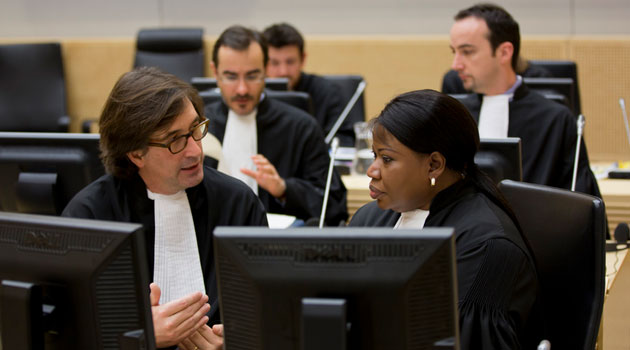
The Appeals Chamber has now sent ICC Prosecutor Fatou Bensouda’s application back to the trial chamber for a “new determination” after finding that there were factual errors in how it came to its decision in the first place/FILE
The Appeals Chamber has now sent ICC Prosecutor Fatou Bensouda’s application back to the trial chamber for a “new determination” after finding that there were factual errors in how it came to its decision in the first place.
The chamber will decide if it has discretion to make a finding of non-compliance, and to refer the matter to the ASP, even where it had been determined that a State has failed to comply with a request for cooperation; and even if the chamber has such discretion, whether the chamber erred in the exercise of its discretion.
Bensouda has blamed the Kenyan government’s non-cooperation for the collapse of her case against President Uhuru Kenyatta.
In her application on November 29, 2013 Bensouda asked Trial Chamber V(b) to allow her to refer Kenya to the ASP over failure to cooperate as required under the Rome Statute.
She argued that the Government of Kenya had refused to submit to her office important documents which she required to solidify her waning case against President Kenyatta.
During two status conferences held to fast-track the progress of her office in preparing for the trial against President Kenyatta, Bensouda accused Kenya of withholding his bank records, land ownership records, vehicles within his possession and among others, companies in which he is a shareholder.
But when the Trial Chamber gave Bensouda a seven day ultimatum on December 3 to make clear if she had a prosecutable case against President Uhuru Kenyatta, it declined to refer Kenya to the ASP for the non-cooperation which Bensouda blamed for the lack of sufficient evidence to prove President Kenyatta committed crimes against humanity in the 2008 post-election violence.
“The Chamber exercised its discretion in not referring the matter to the Assembly of States Parties, since the Chamber was not persuaded that a referral would facilitate a fair trial, was in the interests of justice or was otherwise appropriate in the particular circumstances.”
READ: Bensouda gets 7-day ultimatum in Uhuru case
The Trial Chamber however allowed Bensouda to appeal their decision on non-cooperation in March after taking into consideration, “the request and the observations made by the Kenyan Government and the legal representative of the victims. The chamber decided to authorise the prosecutor to appeal the decision on Kenya’s cooperation,” the judges ruled.
READ: Bensouda pursues Kenyatta over ICC non-cooperation
Attorney General Githu Muigai had argued the Kenyan Government case saying Bensouda needed to file an application in the Kenyan High Court in order to access some of the “private” documents she had sought on President Kenyatta.
President Uhuru Kenyatta himself reiterated that the Kenyan government had been co-operating with the ICC when the new ASP President Sidiki Kaba called on him at State House on August 12.
READ: Kenya has cooperated with ICC, President Kenyatta insists










































